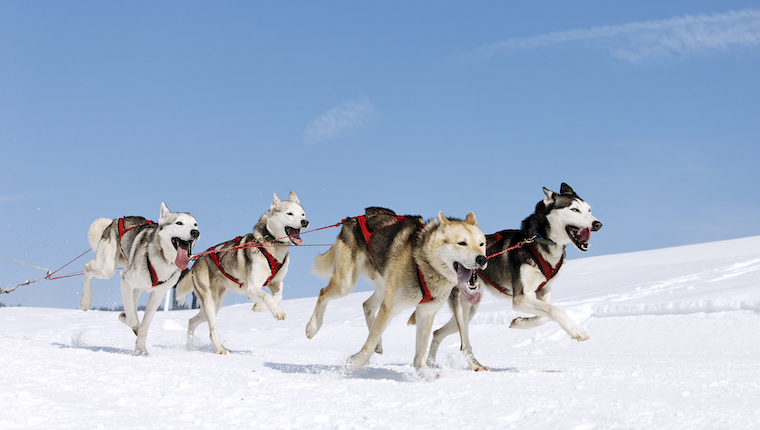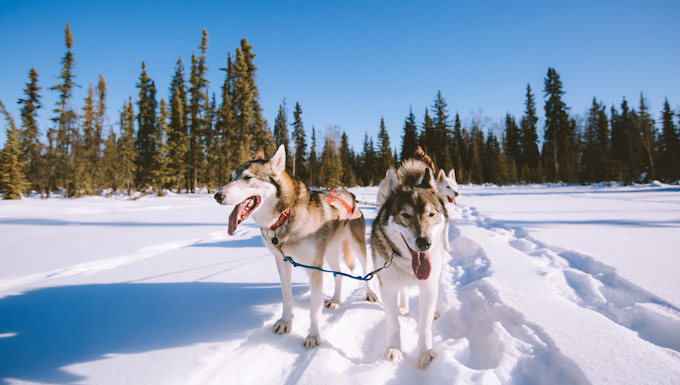What are the dog laws in Alaska? Does Alaska have dog laws? If you live in this state, you might be wondering what the law says about issues like rabies vaccination, dog bites, dog abandonment, or dog cruelty.
Read on for more information about dog laws in Alaska.
Rabies Vaccination Laws
In Alaska, any dog over six months of age must receive a vaccine for rabies. A licensed veterinarian must perform all rabies vaccinations for them to be valid. A rabies tag must be worn at all times in order to show proof the animal is vaccinated.
There are no medical exemptions for rabies vaccinations in the state of Alaska.
If an unvaccinated dog bites someone, they are subject to a ten day quarantine. Dogs (or other animals) who display symptoms of rabies during this time will face euthanasia. If they do not show signs of rabies, they will be returned, but must be vaccinated.
Failure to vaccinate your dog in the state of Alaska is an infraction.
Dog Bite Laws
Alaska follows the somewhat controversial “one-bite” law. This means that, in most cases, a dog’s first attack on a person or another animal cannot be held liable. There are exceptions to this. If the attack is severe, causing significant bodily harm, the owner may still be liable. And if the owner reasonably knew the dog was dangerous and failed to prevent the bite, they may not receive a “free pass,” as the owner could have anticipated the bite.
There are cases where dogs will not face consequences for being aggressors in attacks.
Dog owners are not responsible for attacks in which the dog was provoked or protecting the owner. This could include yelling at, hitting, or throwing objects at the dog. Additionally, if you were trespassing on private property and then were attacked by an otherwise contained dog, the dog’s owner would not be liable.
A dangerous dog, particularly a repeat offender, may be euthanized if this is determined to be in the best interest of the safety of the community. After one documented bite, a dog is considered vicious in the state of Alaska. This means that subsequent bites may lead to euthanasia. Additionally, a severe enough attack could lead the court to determine euthanasia is the best course of action even for a first offender.
Dog Abandonment Laws
In Alaska, animal abandonment is prohibited by law. However, the law fails to really define what this constitutes. The law simply states that it is illegal to release a “pet” species to the wild. Animal abandonment is always dangerous to animals and people that may encounter them. However, it’s especially deadly in Alaska. The temperatures and harsh conditions mean that many abandoned animal may not survive. Additionally, there is a low chance an unaltered dog can interbreed with wild wolves, which damages their genetics.
Dog Cruelty Laws
In Alaska, animal cruelty is most often a misdemeanor. Animal cruelty can have serious consequences. Even first offenders can face jail time and large fines. Consequently, repeat offenders face harsher sentencing. Additionally, convicted animal abusers may lose the ability to legally possess animals for up to ten years. Aggravated animal cruelty carries heavier charges. This differs from typical animal cruelty charges. This is when an act of cruelty results in severe suffering, disfigurement, or death of the animal. Aggravated animal cruelty often results in felony charges.
As in the other 49 states, dogfighting is a felony in Alaska. This doesn’t apply only to those directly fighting their animals. It also applies to promoters or spectators of these events. Yes — watching a dogfight is also a felony.
Tethering Laws
Alaska does not prohibit tethering dogs. There are some criticisms in regards to Alaska’s blatant lack of tethering laws. Without proper restrictions, tethering can be dangerous to dogs. However, many Alaska counties have taken tethering laws into their own hands. There are many county-specific ordinances that apply to specific areas. This means that, while tethering isn’t illegal in Alaska, it’s a good idea to read up on your local ordinances if you plan to tether. As a rule of thumb, provide tethered dogs with accessible shelter, at least ten feet of clean and maintained space. Additionally, never tether to a collar that could potentially choke or strangle the dog.
How Alaska Dog Laws Rank Among Other States
Alaska ranks as a “bottom-tier” state for animal protection laws by the Animal Legal Defense Fund. Out of all 50 states, Vermont comes in at number 37 for animal rights. There are some good things about Alaska’s animal laws. For example, Alaskan law has a wide range of defined care requirements, including food, water, shelter, care, and space. But, there’s still a lot of room for improvement. For example, veterinarians are not required to report suspected animal cruelty, letting some cases go unnoticed.










